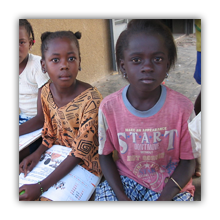Navigation and Service
Jump to:
Empowering Vulnerable Groups (Children)

With the problem analysis, the EC requires an assessment of vulnerable groups including children. In child rights mainstreaming, the aim is to empower children as rights holders. Given our transport sector example, this empowerment analysis could entail:
Marginalised girls of 11 to 16 years from remote regions – Girls may lack knowledge of their right to education, health, rest and leisure. They may lack understanding of the obligations of duty bearers to uphold these rights and of valid entry points to make their claims. They may lack the opportunity to participate in decision-making on access, affordability and safety of transport. Efforts could be made to improve consultations with this group of marginalised children as well as providing opportunities for them to influence transport policy choices and related services.
NGOs dedicated to promoting girl-child education – NGOs may lack knowledge of the channels of impact on children between education access and transport policy. They may lack the resources or networks necessary to influence transport policy-makers. They may lack the skills to facilitate meaningful child and community participation in transport policy-making. Efforts could be made to strengthen their capacity to analyze government plans and priorities and engage in policy dialogue around the best interests of their constituents (children and their families).
